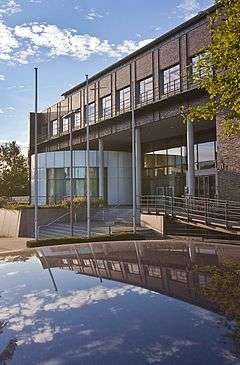Max Planck Institute of Molecular Physiology
 | |
| Abbreviation | MPI MOPH |
|---|---|
| Type | Scientific institute |
| Purpose | Basic research |
| Headquarters | Max Planck Society, Munich |
| Location | |
| Methods | Cell biology, Systems biology, Structural biology, Chemical biology |
Parent organization | Max Planck Society |
Staff | approx. 500 |
| Website | www.mpi-dortmund.mpg.de |
The Max Planck Institute of Molecular Physiology (German: Max-Planck-Institut für molekulare Physiologie) is located in Dortmund, Germany next to the Dortmund University of Technology. It is one of 80 institutes in the Max Planck Society (Max Planck Gesellschaft).
Departments
Mechanistic Cell Biology (Director: Prof. Dr. Andrea Musacchio)
The Department of Mechanistic Cell Biology aims to better understand the molecular mechanisms of cell division and their regulation. The main focus is on the key proteins that control the division of chromosomes during mitosis, a process that separates sister chromatids into two identical daughter cells, thereby maintaining chromosome stability.
Systemic Cell Biology (Director: Prof. Dr. Philippe Bastiaens)
The Department of Systemic Cell Biology studies the regulation of signal transduction processes in cells. These processes control significant cellular functions such as tissue growth (proliferation) or the differentiation of cells into specialized cell types and, thus, determine the fate of each cell.
Structural Biochemistry (Director: Prof. Dr.Stefan Raunser)
The Department of Structural Biochemistry focuses on structural and functional analyses of biologically and medically relevant membrane proteins and macromolecular complexes. Special attention is given to the investigation into the molecular mechanisms of muscle contraction and the infection with bacterial toxins. Furthermore, membrane proteins that play an important role in the synthesis, transport, and homeostasis of cholesterol in the body are examined.
Chemical Biology (Director: Prof. Dr. Herbert Waldmann)
Research in the Department of Chemical Biology concentrates on the interface between organic chemistry and biology. By using biochemical and chemical techniques, researchers identify and develop new tools for the investigation of biologically relevant processes and phenomena.
Emeritus Groups
Structural Biology (Head: Prof. Dr. Alfred Wittinghofer)
Physical Biochemistry (Head: Prof. Dr. Roger S Goody)
Scientific Facilities
Compound Management and Screening Center (COMAS)
Dortmund Protein Facility (DPF)
Biotechnology
Electron Microscopy
References
External links
- Chemical Genomics Centre (CGC)
- Official site Federation European Physiological Societies
- Official site European Federation for Pharmaceutical Sciences
- Official site European Federation for Medicinal Chemistry
- Official site Federation of European Biochemical Societies
Coordinates: 51°29′22″N 07°24′35″E / 51.48944°N 7.40972°E